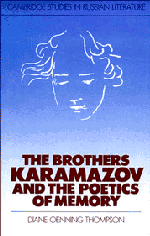Book contents
- Frontmatter
- Contents
- Preface
- Note on the text
- 1 Memory and poetics
- 2 The fictional narrator
- 3 Memory and the system of ascending plots
- 4 The memories of the characters: forms of affirmative memory
- 5 The memories of the characters: forms of negative memory
- 6 Forgetting
- 7 Foretelling
- 8 The Christocentric poetic memory system
- 9 Afterword
- Notes
- Bibliography
- Index
- Titles in the series
5 - The memories of the characters: forms of negative memory
Published online by Cambridge University Press: 05 November 2011
- Frontmatter
- Contents
- Preface
- Note on the text
- 1 Memory and poetics
- 2 The fictional narrator
- 3 Memory and the system of ascending plots
- 4 The memories of the characters: forms of affirmative memory
- 5 The memories of the characters: forms of negative memory
- 6 Forgetting
- 7 Foretelling
- 8 The Christocentric poetic memory system
- 9 Afterword
- Notes
- Bibliography
- Index
- Titles in the series
Summary
And nothing in all nature,
Did he want to bless.
The Demon, A. S. PushkinDostoevsky's artistic imagination always moved along oppositions embodied in characters brought together in the most intense and varied dialogic relations. Thus, memory in The Brothers Karamazov sometimes assumes painful, subversive and destructive forms which cause suffering and ‘catastrophe’. This category of memories we may label negative memory. Such memories form a system of negative responses to the system of affirmative memory, integrated into the novel's encompassing context of cultural memory through various modes of mockery, denial, hatred or subversion of the values contained in the sacred memory. Thus, forgiveness, veneration, faith, remembrances of good deeds, being the keeper of one's brother, love of God and humanity meet their opposites and struggle with revenge, sacrilege, cynicism, mockery of good deeds, fatal abandonments, hatred of God and contempt for humanity. If the timely arousal of a sacred memory illustrates the action of providential Grace, then the unrelenting painful memories of evil acts describe a moral drama of divine Retribution. And if there is the good seed of the Word inscribed in the characters' memories and the novel's cultural context bringing joy and compassion into their lives, there is also the evil seed of various anti-Words which settles in the recesses of their minds and spreads misery and destruction throughout the novel's world.
- Type
- Chapter
- Information
- The Brothers Karamazov and the Poetics of Memory , pp. 126 - 157Publisher: Cambridge University PressPrint publication year: 1991



